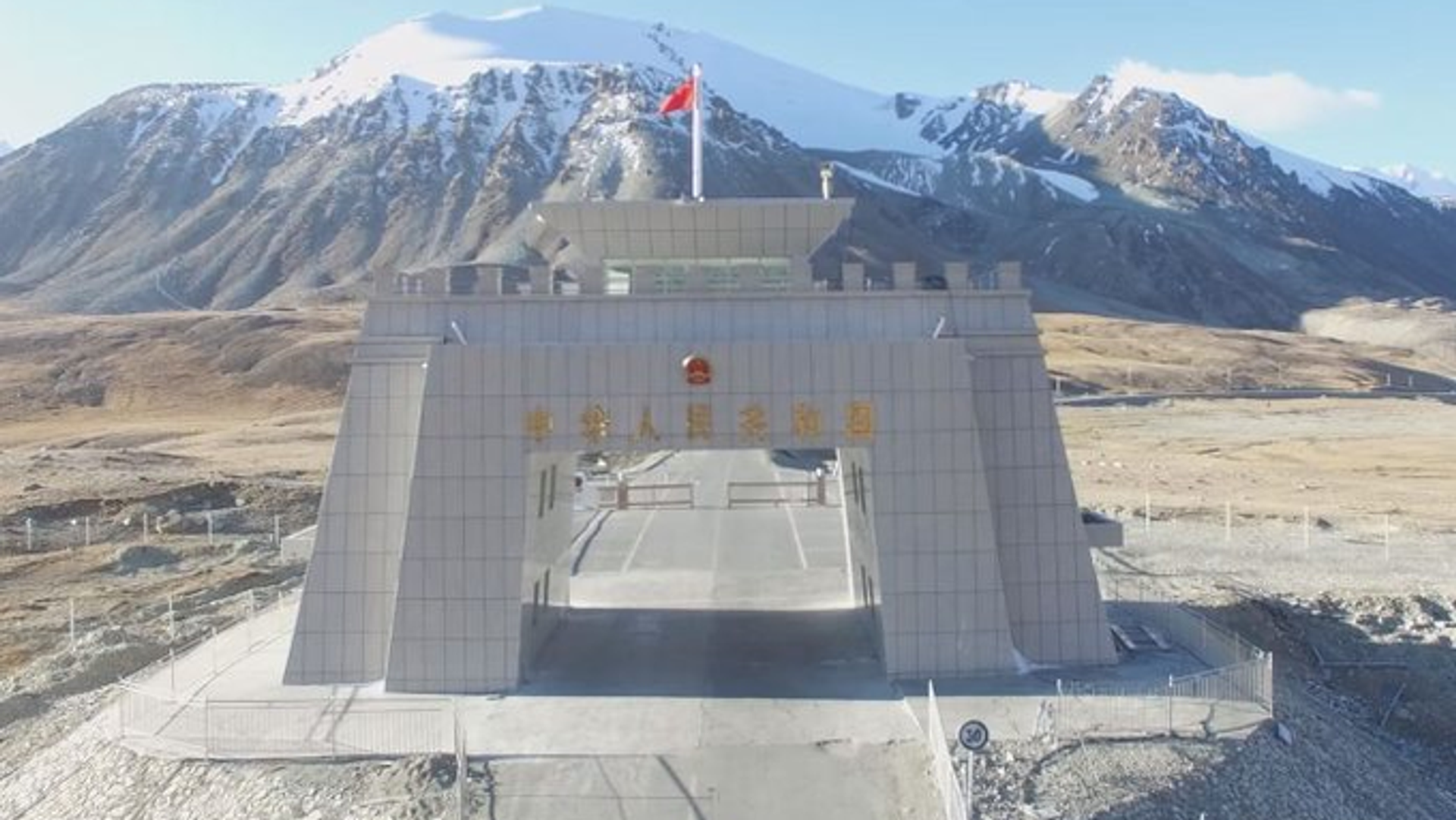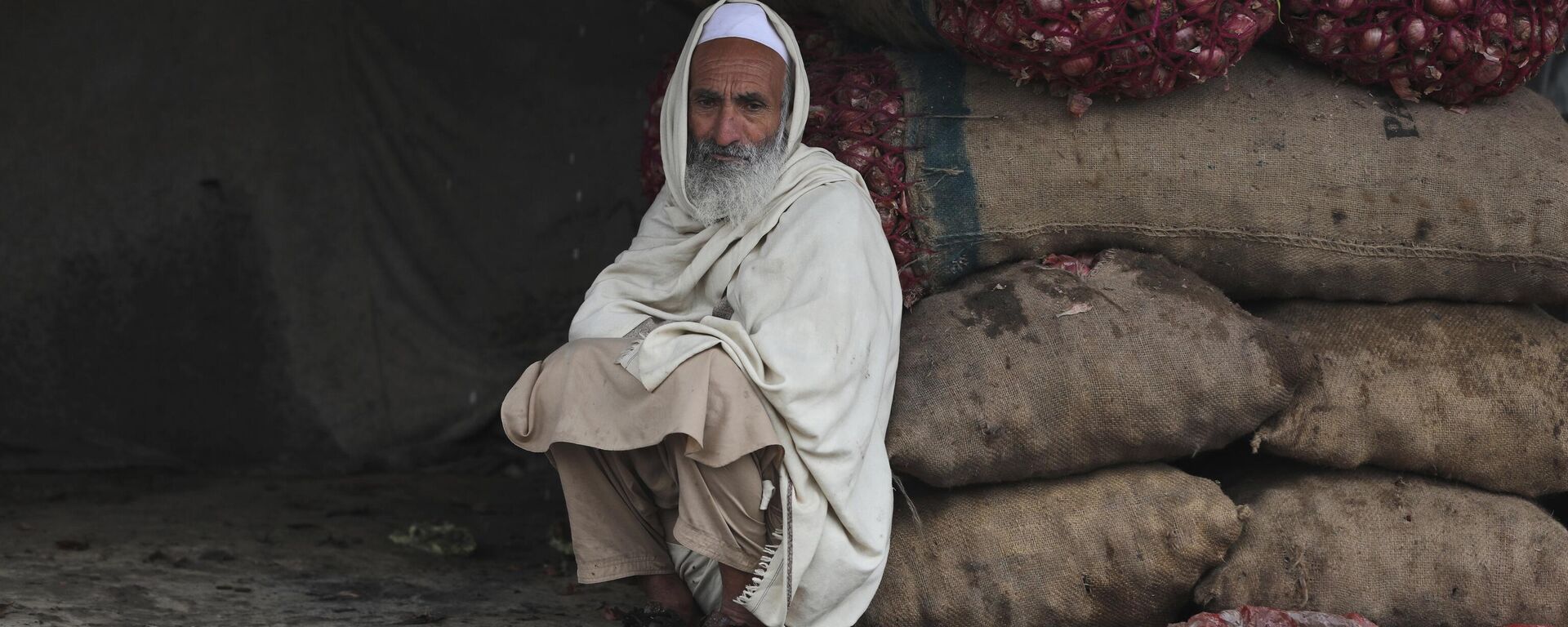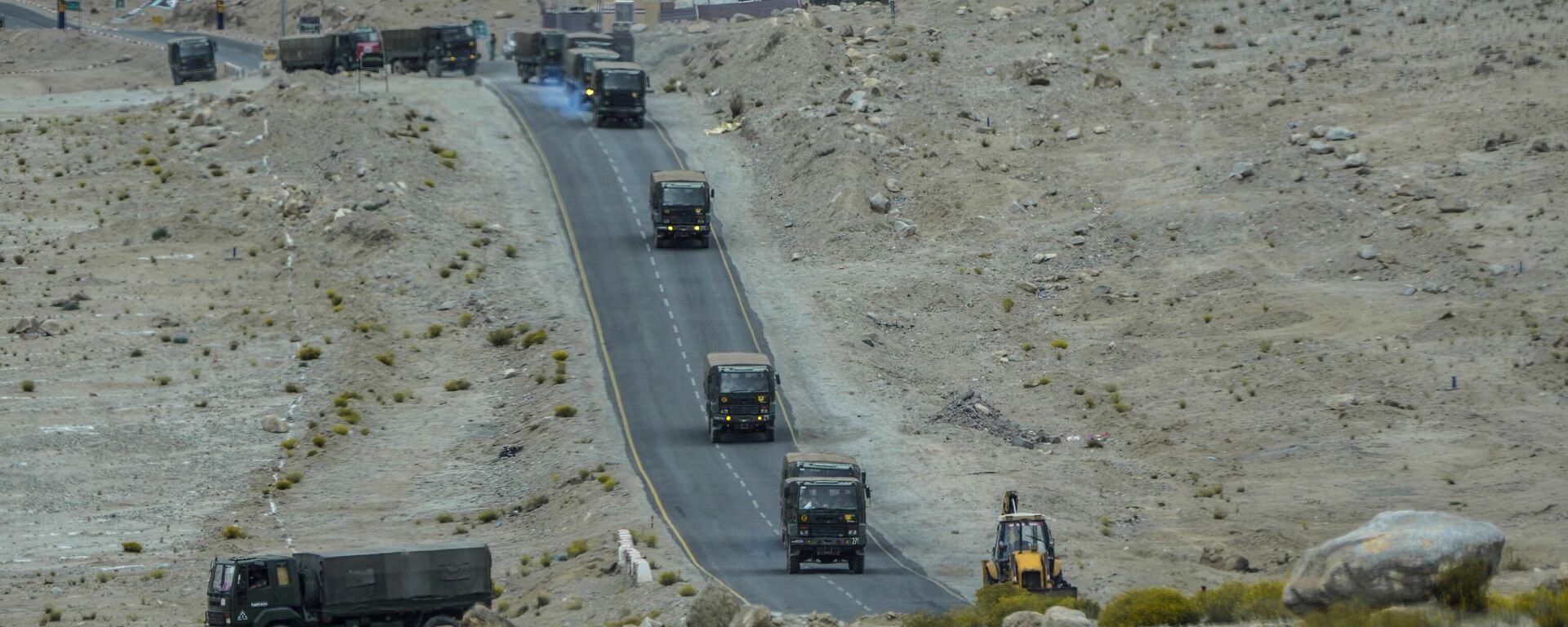https://sputniknews.in/20230406/worlds-highest-border-crossing-reopens-to-connect-pakistan-china-for-bilateral-trade-and-travel-1434749.html
World's Highest Border Crossing Reopens to Connect Pakistan, China for Bilateral Trade and Travel
World's Highest Border Crossing Reopens to Connect Pakistan, China for Bilateral Trade and Travel
Sputnik India
At 5,000 meters above sea level, in the Karakoram mountains lies the Khunjerab Pass, a major trade route between China and Pakistan, and an important gateway... 06.04.2023, Sputnik India
2023-04-06T11:09+0530
2023-04-06T11:09+0530
2023-04-06T11:09+0530
pakistan
china
china-pakistan economic corridor (cpec)
south asia
trade corridor
shehbaz sharif
https://cdn1.img.sputniknews.in/img/07e7/04/06/1441935_0:27:680:410_1920x0_80_0_0_bbe1edaf8cc1faae592185b960aaa137.png
The Khunjerab Pass is an international high mountain pass located on the border of Pakistan and China. It is the highest paved international border crossing in the world, as it is situated at the topmost point of the Karakoram Highway.The strategic pass originates in Pakistan's northern Gilgit-Baltistan region and links up to China’s Xinjiang Uyghur Autonomous region.Before the coronavirus lockdowns in 2020, the pass brought in billions of rupees worth of trade, which also helped support local communities living nearby, however due to the pandemic, China had closed its border for three years.A Good OmenOn Monday, it was reported that the Chinese authorities shared a letter with Pakistani officials regarding the reopening of the Khunjerab Pass for trade. The Chinese port authorities have been instructed to take measures regarding Covid-19 before the arrival of goods from Pakistan.Similarly, Pakistani border authorities have also been asked to take necessary steps to avoid spreading the disease.Businessmen and traders in Pakistan’s northern Gilgit-Baltistan region have welcomed the government’s initiative to reopen this key border pass, hailing it as a "good omen" for trade in the area.Important Gateway to Asia and EuropeThe Khunjerab Pass is the world's highest paved international border crossing, and was completed in 1982 as part of a road called the Karakoram Highway, and it has since superseded the unpaved Mintaka and Kilik passes as the main route across the Karakoram mountain range.On the Pakistani-administered side, the pass is 75 km from the customs and immigration post in the small town of Sost, and about 270 km from Gilgit, the capital of the Gilgit-Baltistan region. On the Chinese side, the pass is in the southwest terminus of China National Highway 314 (G314) and 130 km from the town of Tashkurgan in the autonomous region of Xinjiang.For traders and travelers, the Khunjerab Pass poses a risk of altitude sickness due to its elevation, and it has tough weather conditions for over six months. It also has steep road inclines and seasonal inaccessibility, which makes travel dangerous and difficult in colder months.The pass and the highway leading up to it are seasonally closed due to heavy snow from November 30 to May 1. However, when the road is accessible, during the summer months, the border is open for business and tourists on the weekdays.There are some police checkpoints along the highway that may slow down the journey significantly, but overall travel requires little preparation.Hence, Pakistanis who have a Chinese visa can enter through the Khunjerab Pass and travel further into China and vice versa, Chinese nationals who have a Pakistani visa can enter Pakistan. It should be noted that travelers aren't allowed to cross the border in their cars due to the difficult terrain, but can easily buy tickets for buses leaving from Sost town, which cost around Rs. 3,300 ($12) in 2019.The road that connects Sost town with the Pak-China border is a twisting 90 km road that goes through the world's highest snowy peaks and beautiful plains, with yak herds grazing. The scenery has been described by travelers as truly breathtaking.Before its closing, the Khunjerab Pass had been a vital crossing point for Pakistani students studying in China, and for international alpinists traveling through the mountain ranges. It was also frequented by European tourists traveling through Iran into Pakistan, and onward to China and further East.Bilateral Trade Via the Khunjerab PassIn 2019 before the closing, Chinese-Pakistani trade at Khunjerab Pass topped $856Mln. The cargo import and export figure reached 66,600 tonnes annually between Pakistan’s Gilgit-Baltistan region and China’s north-western Xinjiang Uygur Autonomous Region.The trade volume had increased 1.4 times to 5.99 billion yuan, which was 46.8% higher than in 2018. China was mainly importing textiles, agricultural products and daily commodities, and exporting plants and herbs.The trade at Khunjerab Pass was conducted through the Web-Based One Customs (WeBOC) system. It was a domestically developed, web-based computerized clearance system, providing end to end automated customs clearance of import and export goods. It was designed as part of China Pakistan Economic Corridor (CPEC).Hence, reopening of the pass is projected to revive bilateral trade between the two countries.The announcement was welcomed by the local community in Gilgit-Baltistan, and given that there is no major industry there, local communities relied on the profit made from goods traded with China and on the jobs that were created around the trading business.Over the last three years, local traders and workers associated with this border, including drivers and laborers, suffered due to the lack of income.He added that the Pakistan government should abolish “unnecessary taxes” on traders, pointing out that Gilgit-Baltistan region is classified as a tax free-zone.The announcement of Khunjerab Pass' reopening was praised by government officials. Prime Minister of Pakistan, Shahbaz Sharif, welcomed the news and vowed to accelerate all projects related to the China Pakistan Economic Corridor (CPEC) across the country.In an effort to provide Pakistani students who are studying in China with cost-saving means of transportation, Minister for Planning and Development, Dr Ahsan Iqbal, said that the government was taking measures to quickly restore bus service between the two countries through the Khunjerab Pass.Iqbal also expressed hope that the Khunjerab border facility would be upgraded by both sides so that it could remain open for 12 months and become an all-weather facility.
https://sputniknews.in/20230331/china-provides-2-billion-debt-relief-to-pakistan-amid-imf-stalemate-1388024.html
https://sputniknews.in/20230117/thousands-protest-in-pakistans-gilgit-baltistan-against-inflation--govt-neglect-532487.html
https://sputniknews.in/20230106/pakistan-assures-china-economic-projects-secure-despite-terror-attacks-402456.html
pakistan
china
china-pakistan economic corridor (cpec)
south asia
Sputnik India
feedback.hindi@sputniknews.com
+74956456601
MIA „Rossiya Segodnya“
2023
Aneela Rashid
https://cdn1.img.sputniknews.in/img/07e6/0c/0d/74548_0:0:485:484_100x100_80_0_0_821526e967ae85d041e2d30ee34fa1de.jpg
Aneela Rashid
https://cdn1.img.sputniknews.in/img/07e6/0c/0d/74548_0:0:485:484_100x100_80_0_0_821526e967ae85d041e2d30ee34fa1de.jpg
News
en_IN
Sputnik India
feedback.hindi@sputniknews.com
+74956456601
MIA „Rossiya Segodnya“
Sputnik India
feedback.hindi@sputniknews.com
+74956456601
MIA „Rossiya Segodnya“
Aneela Rashid
https://cdn1.img.sputniknews.in/img/07e6/0c/0d/74548_0:0:485:484_100x100_80_0_0_821526e967ae85d041e2d30ee34fa1de.jpg
pakistan, china, china-pakistan economic corridor (cpec), south asia, trade corridor, shehbaz sharif
pakistan, china, china-pakistan economic corridor (cpec), south asia, trade corridor, shehbaz sharif
World's Highest Border Crossing Reopens to Connect Pakistan, China for Bilateral Trade and Travel
At 5,000 meters above sea level, in the Karakoram mountains lies the Khunjerab Pass, a major trade route between China and Pakistan, and an important gateway to South Asia and Europe. It was reopened this week after a three-year lull and is expected to bring in billions of rupees in trade.
The Khunjerab Pass is an international high mountain pass located on the border of Pakistan and China. It is the highest paved international border crossing in the world, as it is situated at the topmost point of the Karakoram Highway.
The strategic pass originates in Pakistan's northern Gilgit-Baltistan region and links up to China’s Xinjiang Uyghur Autonomous region.
Before the coronavirus lockdowns in 2020, the pass brought in billions of rupees worth of trade, which also helped support local communities living nearby, however due to the pandemic, China had closed its border for three years.
On Monday, it was reported that the Chinese authorities shared a letter with Pakistani officials regarding the reopening of the Khunjerab Pass for trade. The Chinese port authorities have been instructed to take measures regarding Covid-19 before the arrival of goods from Pakistan.
Similarly, Pakistani border authorities have also been asked to take necessary steps to avoid spreading the disease.
Businessmen and traders in Pakistan’s northern Gilgit-Baltistan region have welcomed the government’s initiative to reopen this key border pass, hailing it as a "good omen" for trade in the area.
Important Gateway to Asia and Europe
The Khunjerab Pass is the world's highest paved international border crossing, and was completed in 1982 as part of a road called the Karakoram Highway, and it has since superseded the unpaved Mintaka and Kilik passes as the main route across the Karakoram mountain range.
On the Pakistani-administered side, the pass is 75 km from the customs and immigration post in the small town of Sost, and about 270 km from Gilgit, the capital of the Gilgit-Baltistan region. On the Chinese side, the pass is in the southwest terminus of China National Highway 314 (G314) and 130 km from the town of Tashkurgan in the autonomous region of Xinjiang.
For traders and travelers, the Khunjerab Pass poses a risk of altitude sickness due to its elevation, and it has tough weather conditions for over six months. It also has steep road inclines and seasonal inaccessibility, which makes travel dangerous and difficult in colder months.
The pass and the highway leading up to it are seasonally closed due to heavy snow from November 30 to May 1. However, when the road is accessible, during the summer months, the border is open for business and tourists on the weekdays.
There are some police checkpoints along the highway that may slow down the journey significantly, but overall travel requires little preparation.
Hence, Pakistanis who have a Chinese visa can enter through the Khunjerab Pass and travel further into China and vice versa, Chinese nationals who have a Pakistani visa can enter Pakistan. It should be noted that travelers aren't allowed to cross the border in their cars due to the difficult terrain, but can easily buy tickets for buses leaving from Sost town, which cost around Rs. 3,300 ($12) in 2019.
The road that connects Sost town with the Pak-China border is a twisting 90 km road that goes through the world's highest snowy peaks and beautiful plains, with yak herds grazing. The scenery has been described by travelers as truly breathtaking.
Before its closing, the Khunjerab Pass had been a vital crossing point for Pakistani students studying in China, and for international alpinists traveling through the mountain ranges. It was also frequented by European tourists traveling through Iran into Pakistan, and onward to China and further East.
Bilateral Trade Via the Khunjerab Pass
In 2019 before the closing, Chinese-Pakistani trade at Khunjerab Pass topped $856Mln. The cargo import and export figure reached 66,600 tonnes annually between Pakistan’s Gilgit-Baltistan region and China’s north-western Xinjiang Uygur Autonomous Region.
The trade volume had increased 1.4 times to 5.99 billion yuan, which was 46.8% higher than in 2018. China was mainly importing textiles, agricultural products and daily commodities, and exporting plants and herbs.
The trade at Khunjerab Pass was conducted through the Web-Based One Customs (WeBOC) system. It was a domestically developed, web-based computerized clearance system, providing end to end automated customs clearance of import and export goods. It was designed as part of China Pakistan Economic Corridor (CPEC).
Hence, reopening of the pass is projected to revive bilateral trade between the two countries.
The announcement was welcomed by the local community in Gilgit-Baltistan, and given that there is no major industry there, local communities relied on the profit made from goods traded with China and on the jobs that were created around the trading business.
Over the last three years, local traders and workers associated with this border, including drivers and laborers, suffered due to the lack of income.
According to one resident Nasir Raki, "Usually, the borders remain open for eight months [but] due to its closure, businessmen suffered losses in billions, which can’t be calculated," he said, adding that the prices of items that were normally sold for $3.51 had shot up to $35 during the border closure.
He added that the Pakistan government should abolish “unnecessary taxes” on traders, pointing out that Gilgit-Baltistan region is classified as a tax free-zone.
The announcement of Khunjerab Pass' reopening was praised by government officials. Prime Minister of Pakistan, Shahbaz Sharif, welcomed the news and vowed to accelerate all projects related to the China Pakistan Economic Corridor (CPEC) across the country.
In an effort to provide Pakistani students who are studying in China with cost-saving means of transportation, Minister for Planning and Development, Dr Ahsan Iqbal, said that the government was taking measures to quickly restore bus service between the two countries through the Khunjerab Pass.
"We have requested the Chinese authorities to resume the bus service through this route. And I think this will be very beneficial for Pakistani students who are studying in China," the minister wrote on his Twitter.
Iqbal also expressed hope that the Khunjerab border facility would be upgraded by both sides so that it could remain open for 12 months and become an all-weather facility.





